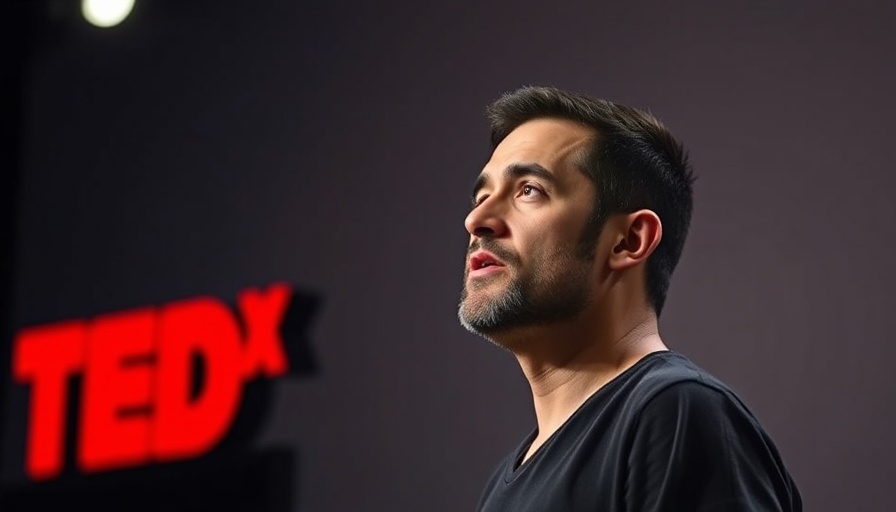
The Unseen Struggles of Parenting Children with Autism
In a society where success is often measured by academic achievements and social milestones, the experience of raising children who face exceptional challenges can feel isolating and overwhelming. In Quentin Mezetin's TEDx talk, he shares his personal journey of parenting children diagnosed with autism, shedding light on the emotional and societal burdens borne by families like his. His reflections serve not only as a chronicle of personal growth but as a rallying cry for understanding the shared responsibility of supporting children with special needs.
In 'How to support parents of children with autism,' the discussion dives into the complex emotional landscape of parenting children with autism, exploring key insights that sparked deeper analysis on our end.
A Journey of Acceptance and Understanding
Initially resistant to the notion that his children could be on the autism spectrum, Mezetin's perspective shifted dramatically upon obtaining a proper diagnosis. His transition from denial to acceptance is significant; he highlights the heavy emotional weight that accompanies such revelations. Acceptance was not merely a personal hurdle but rather a critical step toward accessing resources and support structures that facilitate growth for both he and his children.
The Reality of Ableism in Everyday Life
Mezetin poignantly discusses the concept of ableism—the discrimination against individuals with disabilities—and how it permeates everyday interactions. He recounts incidents where societal biases often render parents like him invisible, leading to misconceptions about their children’s behavior. This societal misunderstanding results in additional burdens for families, which can undermine the health and well-being of both parents and children. The journey of understanding autism is not only about acknowledging the diagnosis but also about navigating the cultural landscape that often devalues those experiences.
Empowering Communities through Collective Responsibility
One powerful message from Mezetin is the call for a communal approach to supporting families of children with autism. He notes the importance of public discourse—elevating the conversation around autism from a merely medical diagnosis to a collective societal responsibility. It’s a shift that could catalyze greater awareness, leading to more inclusive public spaces, educational opportunities tailored for varying needs, and community support structures that empower rather than diminish.
Embracing Innovation in Autism Support
Mezetin's journey illustrates the innovative paths parents can take to seek assistance. From joining community groups to engaging with behavioral specialists, he discovered that solutions are often multimedia—encompassing everything from behavioral therapy to technological aids that foster communication. In a broader context, as society embraces fields like neuroscience and behavioral psychology, the integration of these disciplines into autism support frameworks can foster a more profound understanding and improve outcomes for families.
Transcending Labels: The Power of Community
Community support proved crucial in Mezetin’s journey, reminding us that no family has to face the challenges of autism alone. He proactively engaged in community forums, thereby creating networks of support that exceed familial relationships. This sense of belonging is imperative; it provides not only emotional sustenance but also a platform for advocacy that can influence policy and educational changes.
Strategies for Parents of Children with Autism
Drawing from his experiences, Mezetin shares actionable insights for parents who may find themselves on a similar path:
- Seek Support: Actively engage in community discussions and support groups to exchange ideas and experiences.
- Stay Informed: Research autism and various intervention strategies; knowledge is crucial in navigating available resources.
- Advocate for Inclusion: Encourage inclusive practices in schools and public venues to create environments that support all children.
- Be Patient: Understand that progress may be slow, and celebrate small victories along the way.
Conclusion: Our Shared Journey
Mezetin’s story is a powerful reminder that the complexities of parenting children with autism require empathy and collective action. As professionals, educators, and community members, we have an obligation to foster inclusive environments and champion diversity and understanding in our interactions. By establishing a shared responsibility to support families navigating autism, we not only uplift those in need but enrich our entire society. This perspective not only amplifies voices like Mezetin’s but also drives a culture of inclusivity that can benefit everyone.
If you're interested in fostering greater understanding and support for parents navigating the challenges of raising children with autism, consider joining local advocacy groups or participating in discussions that promote awareness and inclusion.
 Add Row
Add Row  Add
Add 




Write A Comment